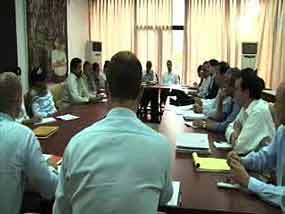 Peace talks between the Colombian government and the Revolutionary Armed Forces of Colombia-People’s Army (FARC-EP) took their second recess today, since beginning negotiations in this capital last week.
Peace talks between the Colombian government and the Revolutionary Armed Forces of Colombia-People’s Army (FARC-EP) took their second recess today, since beginning negotiations in this capital last week.
In tune with reports about the talks that seek an end of more than 50 years of armed conflict, a break was needed following three days of talks held at Havana’s Conference Center, after the first recess on Thursday, November 22.
Sources close to the government team in the negotiations told Prensa Latina that this is not a break, but a normal mechanism within the talks so that parties can conduct their evaluations and consultations.
The 24 hour pause before the resumption of the dialogue which has Cuba and Norway as guarantors, follows a day which resulted in the first joint announcement since the beginning of the process, one week ago.
Yesterday, representatives of the government and the FARC-EP issued a release regarding the creation of a space for citizen participation in the process, aimed at ending decades of clashes with thousands of dead, mostly civilians, and millions of displaced people.
This is to take place at a forum held in Bogota from December 17 to 19 on comprehensive agricultural development policies.
According to the text, the negotiation table asked the United Nations in Colombia and the Center for Consideration and Followup to the Peace Dialogue, at the National University, to organize and serve as rapporteurs for the discussions from the meeting.
January 8 was set for the delivery of conclusions from the forum to the delegations participating in the talks, whose first item on the agenda is the land issue specifically, and the comprehensive development of Colombia’s rural areas.
The General Agreement for ending the conflict and the creation of a stable and lasting peace, agreed to in Havana at a previous meeting, is centered around five issues and the implementation, verification and countersignature of the achievements of the approach.
In addition to the land issue, the agenda includes political participation, an end to the armed conflict, the solution to the problem of illegal drugs, and the treatment of victims.
Talks have been so far marked by secretiveness and discretion regarding discussions held around the negotiation table.
 Escambray ENGLISH EDITION
Escambray ENGLISH EDITION





Escambray reserves the right to publish comments.